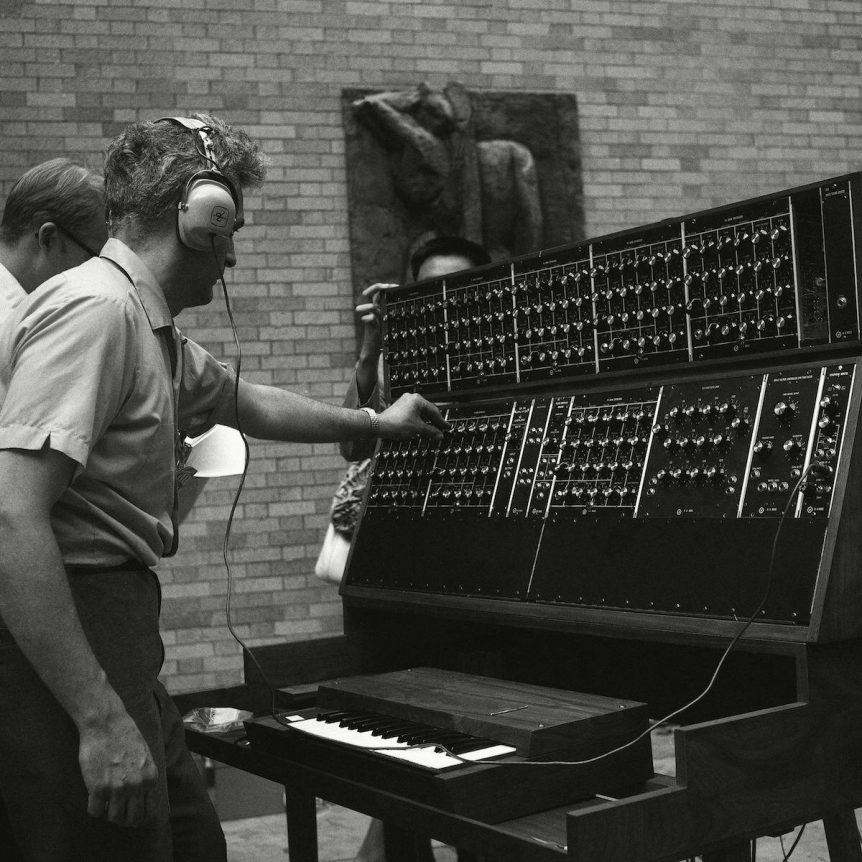part one of this interview is here
The wobble dynamic underlies the total sound, which packs a gritty laden 70s rock punch. Hardly surprising then, that a genre most likely to be familiar to the participants concerned would be chosen to convey the crashing free radicals streaming out of the COVID crisis.
If comparisons need to be drawn, and I don’t think they do, I felt a strong late 70s David Bowie influence, particularly reminiscent of some tracks on Scary Monsters (and Super Creeps) (released 1980.) Another listener placed the sound as not unlike early Who material. Either comparison is only evidencing the overall quality and validity of this recording.
A blog by, Pushing Ahead of the Dame, poses ‘Scary Monsters’ is made up of ‘violent collisions’ of sound and I think this is not unlike the barrage of sound used in ‘Wobble.’

That ‘70s sound’ was made possible by the new innovations in music technology in the decade, such as Moog analogue filters and Eventide H910, the world’s very first digital effects processor, used to great effect on Bowie, Zappa, and even AC/DC albums.
Many of the productions from this era have a certain richness and depth, as large teams of people were involved in making a record. The combined effect of input from a legion of producers, arrangers, musicians, artists, tape ops, engineers, and managers, yielded some of “the best-sounding records in music history.”*

* http://www.musictech.net/guides/buyers-guide/classic-studio-sound-70s-rock-pop- disco/
The ‘Wobble’ epithet was originally to signify a tremolo effect for guitar. A modulation effect, that creates a change in volume, while the ‘tremolo arm’ on the guitar is vibrato, which is varying the pitch. Tremolo has been used to make dramatic musical statements by players consistently through the decades from Duane Eddy to Johnny Marr to Johnny Greenwood (Radiohead).
The classic 70s sound also relied on a solid backbeat. To accentuate the sound on ‘Wobble’ Nic Bailey’s bass guitar and Chip Bailey’s kick drum often play at the same time. Magic happens when they synchronise to give the impression of a full-sounding kick and a punchier bass guitar. The only time the illusion is broken is during a drum fill. Without the bass player, the kick would resemble a pulse-like thud or ‘bop.’
Apart from any technical devices, the sheer energy of this track is undeniable. The higher tones, quick and irregular rhythms, dissonant harmonies, the powerful lyrics and spoken words all impart all combine to ignite a powerful clarion call for collective change.
To reference to Scary Monsters’ again, when the Thin White Duke travelled to the Power Station in New York City to record it, he was seeking a new sound, and invited back Robert Fripp, who had played on ‘Heroes’ and a then newcomer, Chuck Hammer, who he had seen play with Lou Reed the year before.
According to two NME editors, Hammer added multiple textural layers deploying guitar synth and Fripp brought back the same distinctive sound he lent ‘Heroes.’ Returning from the Station to Station sessions, was pianist Roy Bittan, who was recording Bruce Springsteen’s The River (1980) concurrently in the same studio.
Tony Visconti recalled a moment in the studio’s lounge where Bowie’s session drummer turned to Springsteen and asked, “What band are you in?”
Anecdotal, but illustrates the levelling, artistic freedom of the collective and demonstrates that the whole is usually greater than the sum of the disparate parts.

Conclusion
I view this track by OTH as a loud shout to exhort organisations to greater levels of cooperation in all sectors and less divisive competition, grading and ranking. It employs a former musical rhetoric to drive home a contemporaneous message. OTH are ‘about people’s voices being heard.’ Collectively they are telling us that (we) “can’t save you if you don’t save me.”
From the Hill, Vox Populi have shouted…make the better tune.
Over the Hill Music Collective House Band
Liz Kelly (fiddle, piano & Vox),
Chip Bailey (Producer, recording engineer, drummer & Vox),
Bernard Jackson (Bass, Guitar & Vox) – Nic Bailey, Chip Bailey’s son played bass on this recording and did this remotely from his hiome in Sydney, Australia)
Paul Kane (Guitar, Lead guitar & Vox).
Juanita Rea (backing vocals, spoken word, cover artwork)
Produced by Phil d’Alton
Mastered by Jon Moorehead Moosetronix
More OTH – overthehillbelfast.com/
